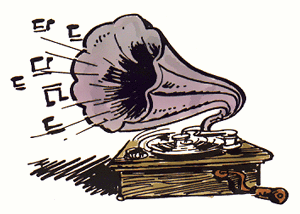phon-, phono-, -phone, -phonia, -phonic, -phonetic, -phonous, -phonically, -phonetically, -phony +
(Greek: sound, voice, speech, tone)
This phono-, phon- should not be confused with another phono-, phon- that means "slaughter, murder, homicide". In Greek, a distinction is made between the phonos (PHOH nohs), "murder", which is spelled with the Greek letter omicron in the last syllable; and the Greek phonos (phoh NOHS), "voice", which is spelled with the letter omega in the last syllable. Both omicron and omega became the letter "o" in English.
phonographic
1. A reference to any system of phonetic shorthand, as that of Pitman.
2. Phonetic spelling, writing, or shorthand.
3. Representing, or consisting of characters representing, spoken sounds; phonetic.
4. Of, pertaining to, or produced by a phonograph.
2. Phonetic spelling, writing, or shorthand.
3. Representing, or consisting of characters representing, spoken sounds; phonetic.
4. Of, pertaining to, or produced by a phonograph.
phonographist
One who writes with shorthand.
phonography
1. The art or practice of writing according to sound, or so as to represent the actual pronunciation; phonetic spelling.
2. The system of phonetic shorthand invented by Isaac Pitman in 1837: so named by him in 1840; Pitman’s shorthand.
3. The automatic recording of sounds, as by the phonautograph, or the recording and reproduction of them by the phonograph; the construction and use of phonographs.
4. The scientific description of sound, or of the voice; phonology.
2. The system of phonetic shorthand invented by Isaac Pitman in 1837: so named by him in 1840; Pitman’s shorthand.
3. The automatic recording of sounds, as by the phonautograph, or the recording and reproduction of them by the phonograph; the construction and use of phonographs.
4. The scientific description of sound, or of the voice; phonology.

phonolite, phonolitic
Name for various volcanic rocks which ring when struck; "clinkstone".
phonologist
Someone who is a specialist in phonology.
phonology
1. Originally, the science of vocal sounds (phonetics); especially, of the sounds of a particular language. The study of pronunciation, transferring the system of sounds in a language. Now, that branch of linguistics that deals with sound systems, or with sound systems and phonetics; the study of the sound system of a particular language. The ensemble for a particular individual speaker is referred to as his/her phonological system.
2. The analysis and description of speech sounds in terms of the linguistic systems in which they function.
3. The study of the elements and principles that determine the overall sound patterns of a language, including phonetics and phonemics.
2. The analysis and description of speech sounds in terms of the linguistic systems in which they function.
3. The study of the elements and principles that determine the overall sound patterns of a language, including phonetics and phonemics.
phonomania
An obsession with noise or sounds.
phonomassage
Exciting movements of the ossicles of the ear by means of noise or alternating suction and pressure directed through the external auditory meatus.
phonometer
1. An instrument for measuring the pitch and intensity of sounds.
2. An instrument for measuring or automatically recording the number or force of sound-waves; phonometrics.
2. An instrument for measuring or automatically recording the number or force of sound-waves; phonometrics.
phonometry
A method of investigating language by the statistical analysis of instrumentally measured speech sounds and informants responses to the same data.
phonomimic
A reference to a system of teaching the deaf to read in which each elementary speech sound is associated with an appropriate gesture.
phonomyoclonus
1. A condition in which a sound is heard on auscultation over a muscle, indicating fibrillary contractions that may be so fine that they are not seen when visually inspected.
2. Clonic spasms of muscles in response to aural stimuli.
3. The intermittent sound that may be heard when a stethoscope is applied to the skin over a muscle afflicted by myoclonic jerks.
2. Clonic spasms of muscles in response to aural stimuli.
3. The intermittent sound that may be heard when a stethoscope is applied to the skin over a muscle afflicted by myoclonic jerks.
phonomyogram
An acoustic recording of skeletal muscular activity.
phonomyography
The recording of the varying sounds made by contracting muscular tissue; usually supplementing visual oscillographic displays.
phonon
1. In physics, a quantum or quasiparticle associated with compressional waves; such as, sound or those in a crystal lattice.
2. The basic unit of sound energy.
2. The basic unit of sound energy.
Cross references of word families related directly, or indirectly, to: "talk, speak, speech; words, language; tongue, etc.":
cit-;
clam-;
dic-;
fa-;
-farious;
glosso-;
glotto-;
lalo-;
linguo-;
locu-;
logo-;
loqu-;
mythico-;
-ology;
ora-;
-phasia;
-phemia;
phras-;
Quotes: Language,Part 1;
Quotes: Language, Part 2;
Quotes: Language, Part 3;
serm-;
tongue;
voc-.


